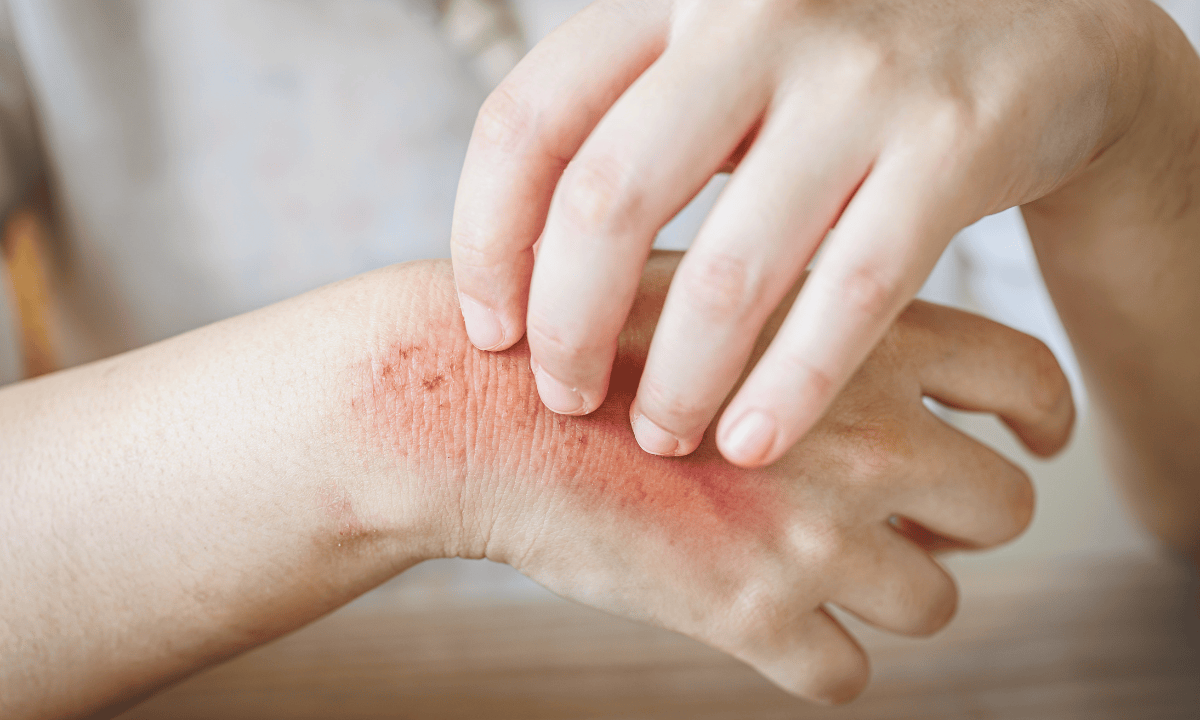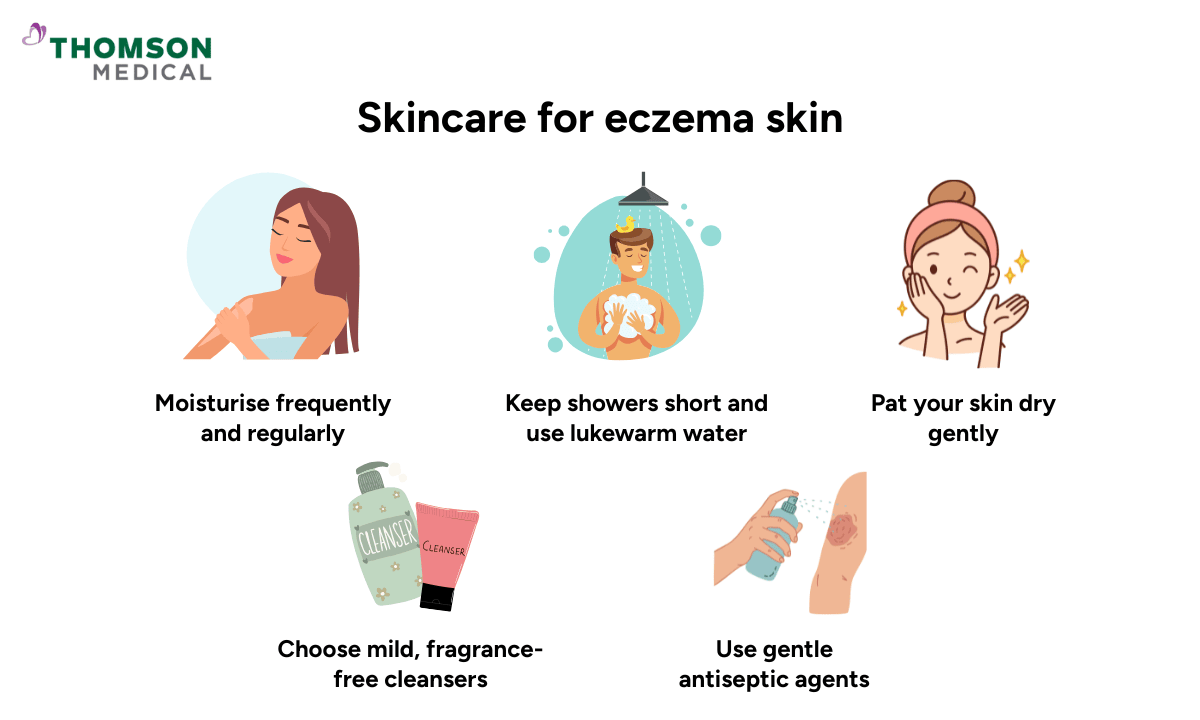The persistent itch keeping you up at night, the dry, inflamed patches making you self-conscious... if eczema has been affecting your life, you're probably searching for answers about how to make it stop. While there's no quick solution, understanding what's happening with your skin can make all the difference.
Let’s explore what causes eczema, clear up common misconceptions, and discover practical approaches to help you feel comfortable again.
What is eczema?
Eczema, also known as dermatitis, is one of the most common chronic skin disorders.
If you’re dealing with eczema, you’ll notice that your skin easily becomes inflamed or irritated. You may also experience dryness, redness, and intense itching.
These rashes commonly appear on your face, knees, hands, or feet, though other areas can be affected too. It may sound worrying, but the good news is that eczema is manageable. With the right treatment and early care, you can effectively control flare-ups and prevent them from affecting your daily life and comfort.
What causes eczema?

Your skin acts as a protective barrier. When you have eczema, the barrier becomes weakened, and irritants and allergens can get through more easily. Your skin then loses moisture faster and becomes more vulnerable to irritation and dryness.
So what causes your eczema? Common factors include:
Genetics:
You’re more likely to have eczema if one or both of your parents have it. It's also common to find family members with allergic rhinitis or asthma because these conditions usually show up together.
Environmental factors:
House dust mites are also a common culprit, along with heat, humidity, sweat, and irritants such as harsh soaps, detergents, and prolonged contact with water.
Internal factors:
Stress, fever, hormonal changes, or lack of sleep can all trigger your eczema flare-ups.
Once you know what’s behind your eczema, you and your doctor can work together to create a personalised treatment plan that works for you.
Common misconceptions about eczema
You may have heard a few misconceptions about eczema, and some of them might even make you worry unnecessarily. Let’s take a closer look at some common myths so you can understand this skin disease with more clarity.
Eczema is due to impurity of the blood and can definitely be cured:
Eczema is actually a chronic skin condition related to your skin barrier, not your blood impurities.
While many people, especially children, outgrow their eczema over time, there is currently no definitive cure. However, with the right care, you can control your symptoms effectively.
Eczema is caused by food:
While food allergies can trigger eczema in some cases, they are less common than you might think. Instead, environmental allergens, such as house dust mites, are more likely to be behind your flare-ups.
Eczema is contagious:
You can’t pass eczema to anyone else. Eczema results from your skin barrier’s reaction to your environment and immune system. Even though it might look red and spread across your skin, it’s not contagious at all.
Eczema is due to a lack of hygiene:
Eczema is not related to your hygiene. In fact, using too many soaps and detergents can actually aggravate the condition by drying out your skin.
When you have a clear understanding of eczema, making informed decisions about your care becomes much easier. However, if there are any misconceptions that still make you worry, don't hesitate to share them with your doctor. They will explain and help you feel more confident about managing your condition.
If eczema is affecting your quality of life, schedule an appointment with Thomson Medical to discuss a personalised treatment plan that works for your skin.
Our dermatologist
Loading...
How to manage eczema
Living with eczema can feel challenging, but with the right approach, you can keep your symptoms under control and minimise flare-ups.
Medical treatments
Depending on your situation, your doctor may suggest:
Prescription creams:
There are two types of prescription creams: topical steroids and non-steroidal creams like topical calcineurin inhibitors.
Topical steroids help reduce inflammation in your skin. For the best results, make sure to follow your doctor’s instructions.
Pro-active therapy:
Your dermatologist may recommend continuing treatment even after your rash clears up. This approach decreases the residual inflammation in your skin, which is not visible (not red), and maintains the duration of rash-free periods.
Oral medications:
Over-the-counter antihistamines can reduce your itching by lowering histamine levels. However, they may not be effective for everyone, so it’s best to consult your doctor for more advice.
Wet wrap therapy:
This involves applying a steroid cream and/or moisturiser and wrapping your skin with a moist, open-weave tubular dressing. It can help your rash heal faster and reduce itching.
Photo-therapy:
If you’re an adult with moderate to severe eczema, your doctor might suggest photo-therapy. It involves exposing your affected skin to specific light bands of ultraviolet B and/or ultraviolet A light.
If you choose this treatment, your doctor will monitor you closely to minimise any potential UV damage.
During flare-ups, treatment plays an important role in keeping your inflammation from getting worse and protecting your skin from infections and scarring.
It’s natural to feel uncertain about which treatment is right for you. Everyone’s skin is different, so your doctor will assess your condition, including its severity, affected areas, your age, and overall health, to find what works best for you.
Skincare for eczema skin

Taking care of your skin every day is just as important as medical treatment, because it can help strengthen your skin’s defective barrier.
Here are simple and effective practices you can apply:
Moisturise frequently and regularly
Keep showers short – about 10 minutes – and use lukewarm water
Pat your skin dry gently after a shower instead of rubbing
Choose mild, fragrance-free cleansers
Use gentle antiseptic agents if you’re prone to frequent skin infections
When you combine consistent skincare with your medical treatment, you’ll have the best chance of keeping eczema under control.
When to see a doctor?
While you can manage your eczema at home, it’s important to reach out to your doctor if:
Your eczema isn't improving with over-the-counter treatments
The itching is so intense, and it affects your sleep and daily activities
You notice signs of infection, such as increased redness, warmth, or swelling
Your rash is spreading quickly or covering large areas of your body
You feel stressed, or your quality of life is impacted
You're unsure about what's triggering your flare-ups
Don’t hesitate to seek help when you need it. Your doctor will guide you through each step to help you manage your eczema and feel better.
If you're experiencing persistent eczema symptoms, schedule an appointment with Thomson Medical. Our dermatologists will work with you to find the right combination of treatments for healthier, more comfortable skin.
FAQ
What is the 3-minute rule for eczema?
The 3-minute rule is a helpful skincare tip: apply your moisturiser within 3 minutes of getting out of the bath or shower. At this point, your skin is still damp and can lock in that moisture more effectively. This simple approach can make a big difference in keeping your skin hydrated throughout the day.
Can stress or environmental factors exacerbate eczema, and how can they be managed?
Yes. Stress or environmental factors are common triggers for eczema flare-ups.
Stress:
Stress affects your immune system and can make inflammation worse.
To manage stress, you can try some relaxation techniques such as yoga, meditation, regular exercise, or spending time on your hobbies.
Environmental factors:
Dust mites, heat, or humidity can also trigger your eczema.
You can minimise exposure to these factors by using allergen-proof covers on your bedding, vacuuming regularly, and maintaining moderate humidity levels in your home.
How long does eczema last?
Eczema is different for everyone. Some people experience flare-ups that last a few days or weeks, while others have symptoms that come and go over months. Many children outgrow their eczema by their teenage years, though some people continue to have it into adulthood.
With proper care and treatment, you can control your symptoms and enjoy longer periods between flare-ups.
Does the weather make eczema worse?
Yes, the weather can affect your eczema. Hot and humid weather can make you sweat more, which may irritate your skin, while cold and dry weather can strip moisture from your skin and trigger flare-ups. That’s why it’s important to adjust your skincare routine with the seasons.
If you're unsure what works best for your skin, talk to your dermatologist. They can suggest the right products and routine that are suitable for your skin needs.
Are there complications from eczema?
Without proper care, eczema can lead to some complications, including:
Skin infections:
When you have eczema, your skin becomes more vulnerable to harmful bacteria, especially Staphylococcus aureus (S. aureus). Scratching creates openings where bacteria can enter, leading to infections that make your inflammation worse and can reduce how well your treatments work.
Thickened, discoloured patches of skin:
You might also develop thickened, discoloured patches of skin from chronic scratching.
Sleep disturbances:
The constant itching, especially at night, can disrupt your sleep.
That’s why managing eczema early and properly is so important. If you notice the symptoms, reach out to your doctor.
How can I stop eczema from spreading?
The best way to prevent eczema from spreading is to avoid scratching, even though it may be difficult. Here’s what can help:
Consider wearing cotton gloves at night if you scratch in your sleep
Moisturise consistently
Identify and avoid your personal triggers
Follow your prescribed treatments
If you notice an infection developing, see your doctor right away, because infections can cause eczema to spread more quickly.
The information provided is intended for general guidance only and should not be considered medical advice. For personalised recommendations and tailored advice based on your unique situation, please consult a specialist at Thomson Medical. Schedule an appointment with Thomson Medical today.
Dr Tan Hiok Hee
Dermatology (Skin)
Thomson Specialist Skin Centre (Novena Specialist Center)
English, Mandarin
.png%3Fbranch%3Dprod&w=640&q=75)
